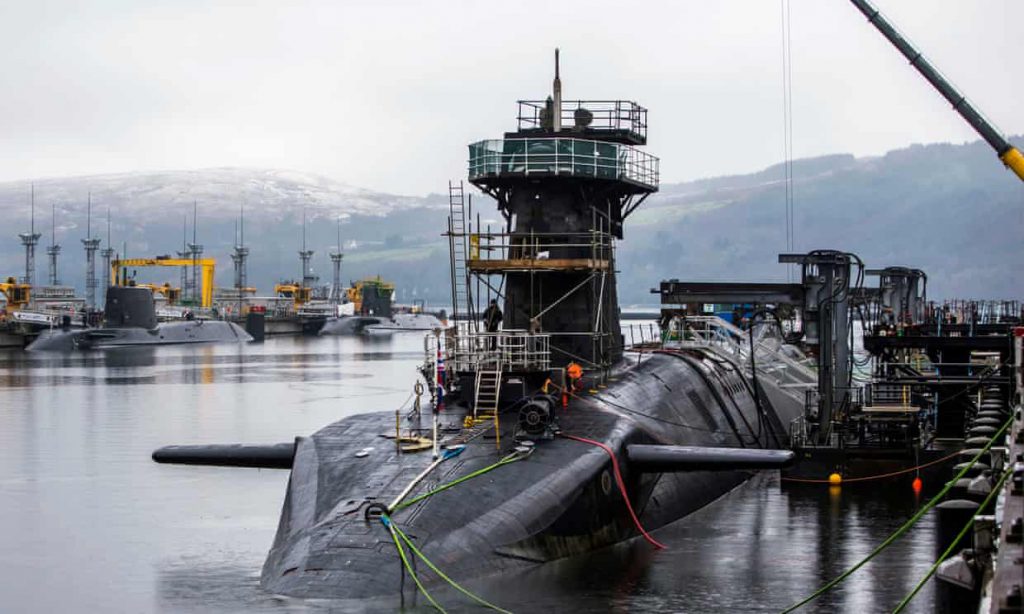Biden administration expected to take ‘critical look’ at next-generation warhead, estimated to be twice as explosive as Trident
By: Dan Sabbagh / theguardian.com

Britain’s most senior defence official admitted there would be “very significant implications” for the future of the Trident nuclear deterrent if Democrats in the US Congress refused to fund a next-generation warhead.
Sir Stephen Lovegrove, permanent secretary at the Ministry of Defence, said that the UK was monitoring the US standoff closely but could not say what impact a refusal to start work on the new W93 warhead would have – or how many billions it would cost.
British politicians and officials have, until now, had little to say about the long-running US row over the W93, crudely estimated to be twice as explosive as the ageing Trident warhead now used by the UK.
Prior to the US presidential election, Democrats in the House of Representatives had refused to fund a $53m (£40m) development programme for the first year of the W93 despite lobbying from both the White House and the UK.
Democrats deleted it for the fiscal year that started on 1 October, and the future of the programme depends on a resolution between the appropriations committees of the House and Senate, currently controlled by Republicans.
Giving evidence to MPs on the defence select committee, Lovegrove publicly acknowledged the depth of British concern. Asked by Martin Docherty-Hughes, an SNP MP, about the impact on the UK if the W93 programme were halted, he said: “There would no doubt be very significant implications were that to be the case.”
Britain has operated its own nuclear weapons since the 1950s but for the past 60 years, following an agreement between the then prime minister, Harold Macmillan, and US president John F Kennedy, the UK has been heavily dependent on US technology.
Trident missiles are deployed in four submarines, one of which is continuously at sea to ensure that it could strike back in the event of an unprovoked nuclear attack. It relies on an existing US W76 warhead, based on a 1970s design, called Holbrook.
Lovegrove told MPs that the replacement UK warhead “had a very close connection” to the US W93, and the UK was following the US process very closely. “I think the Senate has approved it and it’s going to a liaison type of committee fairly soon so we are watching that with a great deal of interest,” he added.
British MPs voted to renew Trident in principle in 2016, but it is expected they will have to vote on a new warhead at some point. In 2016, the Conservatives almost uniformly backed renewal, the SNP voted against, while Labour was split.
The MoD has said that developing the next generation of Dreadnought submarines would cost £30bn plus a £10bn contingency. But Lovegrove refused to say how much the next generation nuclear warhead would cost even if the US did commence the W93 warhead upgrade. “It is too early to provide estimates,” he said.
“Surely you must be making cost, risk analysis of the budgets you already have,” Docherty-Hughes said. “And there’s every possibility that the new president of the United States will scrap the programme from an American perspective.”
Earlier this year Ben Wallace, the defence secretary, pleaded with Congress to approve the $53m of funding for the W93, in a letter to members of the armed services committees of the House and Senate.
A previously unpublished section of a joint memo from the Pentagon and Department of Energy seen by the Guardian also demonstrates that Washington believes the new W93 warhead and the Mk7 aeroshell that houses it are “crucially important to the United Kingdom’s Royal Navy”.
Existing Trident warheads will need to be replaced for safety reasons, the memo adds: “The W93/Mk7 program is also vital for continuing our longstanding commitment of support to the United Kingdom, which is likewise addressing ageing issues in its nuclear force.”
Kingston Reif, a nuclear analyst at the Arms Control Association, said that he would expect Joe Biden’s incoming administration to take “a critical look” at the W93 programme. It was controversial because of the weak development rationale and that “the weapon would be the first newly designed warhead to enter the US stockpile since the end of the cold war”.
A new prime minister on coming into office is supposed to write a letter giving the submarine commanders instructions what to do if the UK has been destroyed in a nuclear war, which traditionally is judged as when BBC Radio 4 is no longer able to broadcast.
